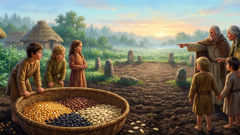Introduction
In the heart of medieval France, when the world was still shrouded in myth and every castle held secrets, love was a language spoken in glances and sighs, and poets dared to dream in allegory. The air carried the scent of meadowsweet and the promise of adventure, and stories were painted not only with words but with symbols. Within this tapestry of courtly life, an ancient walled garden whispered of enchantments, where only the bravest dared to seek what their hearts most desired. Such is the world into which Guillaume, a gentle-hearted young man of humble birth, found himself drawn one cool spring night. Restless and intoxicated by tales of chivalry and longing, Guillaume wandered the moonlit forest until, lulled by the babbling of a hidden stream, he drifted into slumber beneath a blossoming hawthorn tree. Dreams stole over him like silk, and in this vision he was transported beyond the boundaries of the waking world—into a garden more splendid than any royal court, where every flower blushed with secret meaning and every path promised peril or delight. Here, nothing was as it seemed. Statues danced when no one watched, laughter lingered in the hedges, and the very air shimmered with anticipation. At the garden’s heart, legend claimed, bloomed the most exquisite Rose, guarded jealously and yet longing to be claimed by one worthy of true love. In this dreamscape, Guillaume’s quest would begin—not with sword or shield, but with a trembling hope and a heart yearning to prove itself. For this was no ordinary adventure. It was a pilgrimage through the tangled lanes of desire, doubt, and devotion; a journey where every step would bring Guillaume closer to—or further from—the Rose that embodied all his longing. Guided and hindered by curious figures—embodiments of Joy, Reason, Jealousy, and more—Guillaume would face riddles, temptations, and revelations, each testing the sincerity of his love and the depth of his resolve. Only by passing these trials could he hope to reach the Rose and discover whether love is truly worth all its thorns. Thus begins the quest of the Rose, an odyssey as old as yearning itself, and yet forever new in the heart of each who dares to dream.
The Threshold: Entering the Enchanted Garden
Guillaume’s dream began with music—lilting and strange, rising from beyond a wall veiled in morning mist. He followed its call, finding himself at the foot of an ancient gate entwined with wild roses. The portal was both inviting and forbidding, carved with warnings and promises: 'Only the pure of heart may enter; only the bold may find the Rose.' With a deep breath, Guillaume pressed his palm to the cool ironwork. The gate creaked open, and dawn’s golden rays spilled into the garden, illuminating a realm far richer than any tapestry woven in the halls of Chartres or Paris.

He stepped onto a path bordered by lavender and thyme, where butterflies drifted lazily and birds sang madrigals of longing. Every stone beneath his feet seemed set with intention. To his right, a slender stream meandered between clusters of narcissus and peonies; to his left, marble statues gazed with knowing smiles. Guillaume’s heart beat faster, not just with awe but with the delicious fear that he had crossed into a place where ordinary rules no longer held sway.
Suddenly, a figure emerged from the shadows—a woman in flowing azure, her eyes bright as cornflowers. 'I am Lady Idleness,' she announced, her voice like silver bells. 'I watch the gate and greet all who enter. Why have you come to the Garden?' Guillaume stammered an answer: he sought the Rose, drawn by tales of its beauty and promise. Idleness laughed softly. 'Many seek the Rose, but not all find it. Still, you may pass. But beware: this place is woven from desires, and desire is both blessing and burden.' She pressed a key into his hand—delicate, rose-shaped, smelling faintly of honey—and faded into a bower of sweetpeas.
As Guillaume wandered deeper, he met a band of revelers: Youth, Joy, and Pleasure, dancing on dew-dappled grass. They urged him to cast aside all cares and lose himself in their frolic. For a moment, he was tempted—to forget his quest and simply revel in the garden’s delights. But as the sun rose higher and shadows deepened, he remembered his purpose. Gently, he excused himself, clutching the key and pressing onward, though the laughter of Joy lingered like perfume.
At every turn, new wonders revealed themselves. He passed a fountain where Hope knelt, gathering water in a chalice of crystal. 'Drink, and your spirit will be lightened,' Hope whispered. Guillaume drank, feeling courage surge through him. Yet even as he pressed onward, the garden changed. The path narrowed, overhung by tangled branches, and the air thickened with the scent of longing. Statues here bore troubled faces, and thorns pressed close to the path. It was no longer a place of simple pleasure, but a labyrinth of heart’s desire.
At a crossroads, Guillaume encountered Reason—robed in pale gray, holding a lantern that burned with steady light. Reason cautioned him: 'The Rose is not won by passion alone. You must know yourself and weigh your heart’s intent.' Guillaume listened, torn between the call of longing and the sober counsel offered. Ultimately, he promised to heed Reason’s advice, but could not—would not—turn back. For the Rose called to him still, from somewhere deeper within the garden’s embrace.
The Labyrinth of Virtues and Vices
With Reason’s lantern glowing faintly at his side, Guillaume pressed on. The paths beneath the trees grew more intricate, and soon he found himself wandering a living labyrinth: hedges so tall and close together that only glimpses of sky peeked through the leaves. Flowers bloomed in impossible hues along twisting corridors, some so fragrant they made Guillaume’s head swim. Yet not all was beauty—some corners bristled with nettles, while others echoed with sighs or distant weeping. It was here that the allegorical nature of the place began to reveal itself more sharply.

At the first turn, Guillaume encountered Courtesy, a stately figure clad in gold and green, who greeted him with a warm embrace and guided him past brambles that might have torn his clothes or his spirit. Courtesy taught him the art of speaking sweetly, of bowing at the right time, of listening more than speaking. For a while, the path seemed easier. Yet as Guillaume rounded the next corner, he met Danger—a knight in crimson armor, whose sharp gaze warned him that the Rose was not for the faint of heart. 'To love is to risk,' Danger declared, blocking the path with a drawn sword. 'Will you face hurt and humiliation? Will you dare to hope?' Guillaume bowed, uncertain but resolute: he would take the risk, for his heart would settle for nothing less than the Rose. Danger let him pass, but shadows seemed to cling more tightly to the labyrinth’s corners.
Further along, Guillaume was assailed by Jealousy—a hooded figure who whispered venomous doubts: Was the Rose meant for him? Was he worthy? Did another already hold her favor? The words stung, and for a time Guillaume wandered lost, circling back on himself, beset by anxieties. But at a fountain’s edge he met Friendship, gentle and steadfast, who encouraged him to speak his fears aloud. Friendship listened without judgment and offered comfort, dispelling the darkest clouds from Guillaume’s mind.
Deeper into the maze, Guillaume faced more trials. Idleness returned, tempting him to rest beneath a willow’s shade, but this time he resisted—he’d learned that longing without effort leads only to sorrow. Reason appeared at moments of greatest confusion, offering reminders to balance passion with prudence. He encountered Wealth, who dazzled him with jewels and promises of comfort, but Guillaume recognized that gold could not purchase a heart’s true desire. Pride strutted past in gilded armor, urging Guillaume to demand the Rose as his due, but he saw through Pride’s bravado and chose humility instead.
At last, Guillaume reached the labyrinth’s heart—a tranquil glade where the air was cool and the grass soft as velvet. There he found Patience, quietly weaving garlands. Patience smiled. 'The Rose cannot be rushed nor forced. Only by waiting and tending with care may it be won.' Guillaume knelt beside Patience, learning to quiet his heart, to cherish hope without desperation. It was the hardest lesson yet, but as time passed, he sensed a change within himself—a stillness, a steadiness he’d never known.
When Guillaume finally rose to continue his journey, the labyrinth had subtly altered: the hedges parted more willingly, the thorns withdrew, and shafts of sunlight pierced the gloom. He understood that while the path to the Rose was tangled with virtue and vice alike, it was his choices—and his willingness to learn from each encounter—that shaped his destiny.
The Heart’s Trial: Reaching for the Rose
Freed from the labyrinth, Guillaume followed a winding avenue of cypress toward the garden’s innermost sanctum—a place so secret that even sunlight seemed to tread softly. The way was watched by guardians: stern statues carved as lions and griffins, their eyes fixed on a rose-covered bower at the glade’s center. From within came a perfume both intoxicating and dizzying; it tugged at Guillaume’s senses, promising bliss but warning of pain.

He approached with trembling steps. As he neared the bower, a wall of crystal thorns rose before him—each thorn refracting light into rainbows, each tip gleaming with promise and peril. Atop this living barrier bloomed the Rose herself: not just a flower, but a radiant maiden whose hair fell like golden petals and whose eyes shimmered with both joy and sorrow. She beckoned silently, but between them lay the trial of all lovers—the test of sincerity, of sacrifice, of understanding what love demands.
At that moment, new allegorical figures arrived to confront Guillaume. Fear appeared as a pale figure clutching a mirror. 'Look and see all you might lose,' Fear whispered. The mirror showed images of rejection, loneliness, shame. Guillaume’s knees weakened, but he refused to turn away. Then Pity stepped forward—a gentle presence with tear-streaked cheeks—reminding him that love often means bearing another’s pain as one’s own. Last came Shame, robed in shadow, who tempted him to abandon the quest rather than risk humiliation.
Guillaume recalled all he had learned: Joy’s laughter, Reason’s lantern, Patience’s quiet strength. He knelt before the crystal thorns and spoke with honesty, his voice soft but sure: 'Rose, I seek not to possess you, but to serve, to cherish you for your own sake. I accept your thorns as well as your beauty. I ask only that you let me love you as I am.'
The garden held its breath. For a moment nothing stirred; even the birds hushed their song. Then the Rose-maiden smiled—a smile filled with warmth and melancholy, as if she knew all the pain and sweetness love could bring. The crystal thorns melted away, replaced by a path strewn with petals. Guillaume stepped forward, his heart racing. He reached out, and the Rose placed her hand in his. Light flared around them—soft, golden, suffused with hope and longing. The world seemed to dissolve into color and music as the boundaries of dream and waking blurred.
In that embrace, Guillaume saw not only the Rose’s beauty but the depth of her soul: her fears, her dreams, her wounds and joys. They stood together at the garden’s heart—two beings united not by conquest or possession, but by mutual understanding and devotion. The dream grew brighter until Guillaume felt himself lifted out of time, suspended in an endless moment of fulfillment and peace.
When at last he opened his eyes beneath the hawthorn tree, morning sunlight filtered through the leaves, warm on his cheek. The memory of the garden lingered—a perfume on the air, a melody in his mind, and the knowledge that love, like the Rose, is won not by force but by gentleness, patience, and truth.
Conclusion
The world Guillaume returned to seemed at once unchanged and forever altered. The forest sang as before, and sunlight played upon the river’s surface—but within him, something essential had shifted. He rose from beneath the hawthorn tree with a new steadiness in his step and a gentle light in his eyes, as if he carried a secret flame none could extinguish. The lessons of the garden lived on in his heart: that love is not conquest or prize, but an ongoing act of courage and tenderness. Its trials are many—doubt, jealousy, fear, and longing—but each overcome not with force, but with honesty, humility, and patient devotion.
People often asked Guillaume in later years if he had truly found the Rose. He would smile and answer that he had learned love is not a single blossom to be picked and kept, but a living thing—thorned and delicate, needing care and understanding every day. The memory of his dream remained a wellspring of hope and inspiration, guiding him through joys and heartbreaks alike. And so, though the walled garden faded with dawn’s light, its truths endured: that every soul who dares to love walks their own labyrinth, faces their own trials, and discovers—if they are brave and patient—their own Rose at journey’s end.













